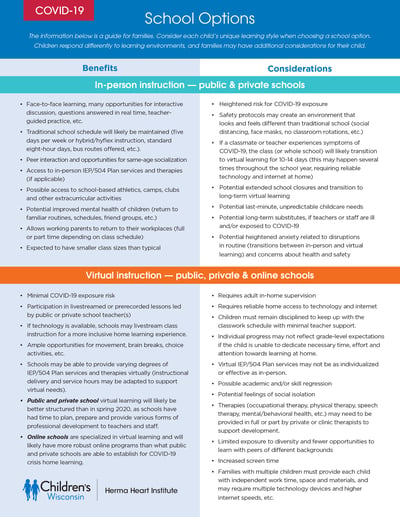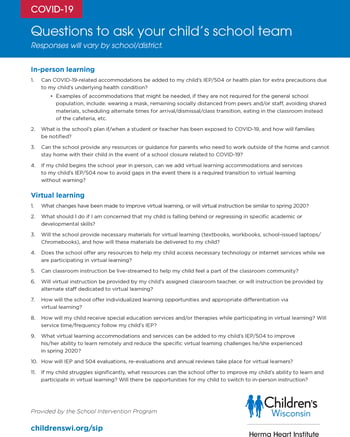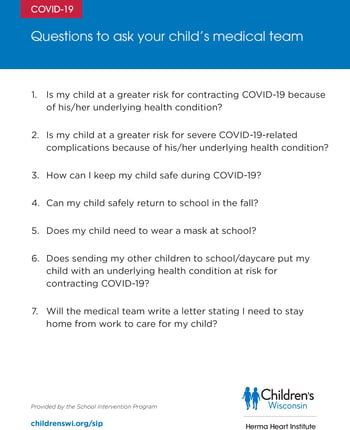
While August often brings back-to-school excitement and jitters, many families are experiencing uncertainty, stress and confusion about returning to school amidst the COVID-19 pandemic. Although children are generally less affected by COVID-19 than adults, the Centers for Disease Control and Prevention (CDC) cautions that medically complex children might be at higher risk for severe illness from COVID-19.
Yet, the opportunity to learn in-person at school is also extremely important. The American Academy of Pediatrics (AAP) has related the importance of in-person learning to social development and educational progress. However, the AAP also states that a “one-size-fits-all approach is not appropriate for return-to-school decisions.” While the CDC has provided guidance on how to return to in-person school as safely as possible, and Paul Veldhouse, MD, a pediatrician at our Forest View Pediatrics primary care office, authored a blog post about those recommendations, families with a medically complex child are left wondering what type of schooling is right for them.
School Intervention’s expertise
In its five years, the School Intervention Program has made incredible progress improving long-term academic and developmental outcomes for children with heart disease. Many of these children often look like any other student to a teacher or school administrator. But our work and research demonstrates that special attention and support are needed to ensure these children are able to thrive in academics, social-emotional functioning, attention, behavior and all areas of learning and development.
Read more: How School Intervention is bringing the doctor’s office and the classroom together
Under normal circumstances, our School Intervention Program specialists dedicate countless hours to our Herma Heart Institute families to ensure appropriate school supports are in place for cardiac patients. The specialists work to create and improve individualized school health and education plans with special accommodations recommended to meet each child’s unique and comprehensive school support needs. With the overnight adoption of virtual learning in spring 2020, many of these school plans and supports had to adapt quickly to the new virtual learning environment. As always, our specialists were there to help.
Resources for families
As we look forward to the 2020-21 school year, the school environment may feel murkier than ever for families as they weigh school options like in-person, virtual, homeschool or homebound (in-person instruction by a teacher in the family’s home). To echo the AAP, there is no “one-size-fits-all approach,” but our team has created a guide of considerations to help families make more informed decisions (click image to enlarge).
 Returning to school safely amid the COVID-19 pandemic is based on a number of factors, including the severity and complexity of the child’s medical condition, the school district’s guidelines, as well as the family’s comfort returning to public spaces. The types of precautions to prevent the spread of COVID-19 vary significantly between school districts, and it is essential to know your school’s guidelines and plans.
Returning to school safely amid the COVID-19 pandemic is based on a number of factors, including the severity and complexity of the child’s medical condition, the school district’s guidelines, as well as the family’s comfort returning to public spaces. The types of precautions to prevent the spread of COVID-19 vary significantly between school districts, and it is essential to know your school’s guidelines and plans.
Other important factors involved in deciding whether or not to attend school in-person include:
- Health and safety
- Ability to learn and progress successfully in a virtual learning environment
- Access to special education services and accommodations
- Potential loss of instructional time and access to therapy services
- Mental health, coping with isolation from peers, missed social opportunities, and potential development of separation anxiety
- Access to internet and technology resources necessary to engage in virtual learning
- Parents’ ability to monitor, assist and/or provide teaching instruction within the home
- Financial implications of missing work or hiring another caregiver to supervise children at home during the school day
For many families, these considerations are just the tip of the iceberg and there may be lingering questions with answers that can often vary by school district. To further assist families, our team has compiled a list of questions that can help them understand their school’s full plan and their medical team’s recommendations.
Click image to enlarge
The best return-to-school option will depend on each family’s unique considerations. Ultimately, families are experts on their own children and the resources provided can help in making the most informed — and safest — decision for each child.
While the upcoming school year will certainly look and feel much different than anything we’ve experienced before, one thing all families can count on is Children’s Wisconsin will be there to provide care and guidance.
School Intervention is a free service available to Herma Heart Institute families as a standard part of cardiac follow-up care. For more information, please visit the School Intervention Program web page or contact us at schoolIntervention@childrenswi.org or (414) 266-4494.
Children's Wisconsin Resources

Written by
Kyle Landry
Manager
Related Stories
No related articles found.





